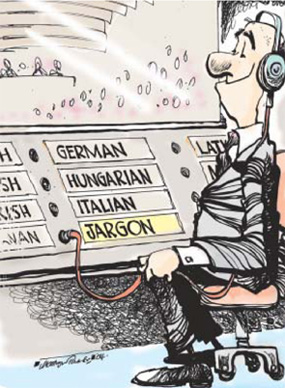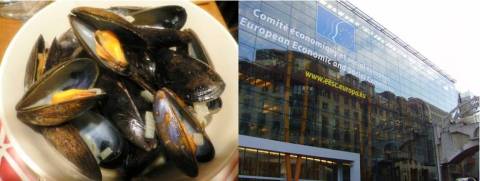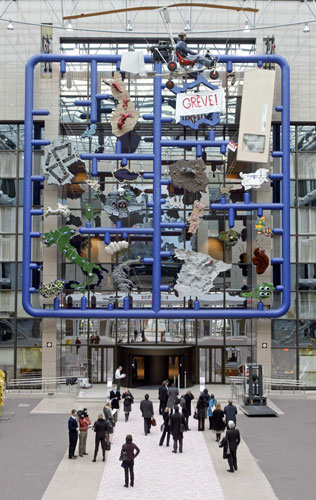Archive for the ‘EU’ Tag
Th!nk About It: The Jury Team – a paradoxical party with a good advert
This Th!nk About It post can also be viewed here.

A good advert by a bad party
So there I was, trawling through the job listings on w4mp when I came across a rather unusual advert.
For those who don’t know, w4mp is a website primarily for parliamentary interns that lists available jobs in Westminster. Most are unpaid; the rest are under £25k a year.
It was with surprise – and more than a hint of suspicion – then, when I came across a job with a salary of “€91,980 plus expenses”.
I thought it was some kind of joke.
The listing states:
Based in Brussels, with some time in Strasbourg, you will carry huge responsibility, acting as an Independent-minded MEP.
Yes. An advert for an MEP in the upcoming elections has been listed on a website for interns.
What party, I hear you cry, would try and recruit interns as members of the European Parliament? And how on earth can someone be an independent-minded MEP? Surely an MEP votes in line with their party, right?
Wrong. If we continue reading…
Although advertised by the Jury Team (a political party), if elected you will be free to make your own decisions and vote as you wish on behalf of millions of people within your region.
Eh?
Unfortunately there’s no turning to the party’s founder, and former Tory HQ director general, Sir Paul Judge for clarification. Because in an interview with the BBC’s Daily Politics he described the Jury Team as a “not-party party”.
Clear as mud, Sir Judge, clear as mud.
So I resorted to the party website…
Are you unhappy with the way things are? Do you believe they can change? By joining the Jury Team, you are becoming part of a political party like no other.
The Jury Team is a political movement created with the goal of making politics more accessible, politicians more accountable and political institutions more transparent.
The Jury Team intends to put forward 70 candidates for the UK and we are offering everyone the chance to run as a candidate for the European Parliament.
How very revolutionary. And the revolution doesn’t stop there; because the Jury Team are a new political party, and in virtue of this – as with all new parties – they need a gimmick. UKIP had Kilroy-Silk – the Jury Team has “modern technology”…
The BBC dedicated a whole article to the gimmick: the party’s candidates will be selected by text.
I mentioned that I was suspicious when I saw the advert listed on an intern website; the oxymoronic “not-party party” did not quash these concerns, and neither did the texting gimmick. But what makes me most uncomfortable about the Jury Team is its paradoxical nature.
Bear with me.
Let us recall the ‘relativism paradox‘: relativism fails because the relativist says there are no absolutes, and yet has to claim that the relativistic principle is absolutely true. The principle is undermined by its very existence.
Now let us consider the Jury Team, or what I will entitle the ‘Jury Team paradox’: the Jury Team fails because the Jury Teamist says the party-political system is corrupt in virtue of having different parties with different aims. And yet the Jury Team is a party with its own aims (the 12 “proposals” can be found on the website) – the details of the aims are irrelevant.
The Jury Team is undermined by the principles for which it stands; it is undermined by its very existence.
I am still not entirely convinced the Jury Team is not a joke.
Either way, though, its advert is pretty damn good – see top of post. And for that I’ll forgive it a multitude – if not all (it’s hard to ignore inherent paradoxes) – sins.

Th!nk About It: laptops, milk or voting in the European election?
This Th!nk About It post can also be read here – as ever, feel free to vote for me!
News flash! The European Parliament has launched its election campaign materials. With unsurprisingly blue results.
It is likely that there’s more hanging on the forthcoming election than ever before (global economic crisis/EU expansion/Eurozone problemos) – so let us have a quick look at what the EU thinks sells the EU.
The brief presented to advertising company Scholz & Friends (I love the “& Friends”) was: “to draw the voters’ attention to the elections’ relevance for their own personal life and to encourage 375 Million European citizens to vote”. No, I don’t envy them their job either.
Pray tell, then; what exactly have the powers-that-be decided will encourage us to vote in June?
Chicken packaging, apparently.

(All graphics: Scholz & Friends)
And plugs.

Thankfully, though, it doesn’t end there -there is more to life than chicken packaging and plugs and the EU know it.
There’s also the eternal dilemma of laptops vs milk.

And books or satellites or tractors.

I concede here I am being a tad harsh. At least the issues these last two images are supposed to represent (balancing family and career and investment in education/farming/technology) are important, even if not done justice by the reductionist nature of the photographs.
Other issues that the EU feel will spur us to vote – as far as I can tell from the often obscure graphics – include security, genetic modification, fuel, energy and border control. And the economic crisis, let us not forget the economic crisis.
Unfortunately, it is all too easy to forget the economic crisis whilst perusing the campaign materials – for it is given as much prevalence as chicken packaging (one billboard in twelve).
Scholz’s friends have, I fear, let him down.
Surely, when considering what is going to encourage 375 million European citizens to vote this would be the main – perhaps the only issue – to plaster across billboards throughout the continent. For now at least, I think it’s fair to predict that the standardisation of plugs is the last worry on most peoples’ minds. I fear it is unlikely to spur one EU citizen to vote, let alone the other 374,999,999.
Yet again, I regret to say, the EU has let itself down when it comes publicising its – often hugely valuable -purpose. Capitalising (almost a pun!) on the economic crisis, and the EU’s ability to actually do something about it, had the potential to inspire millions to vote in an election they didn’t even know existed last year.
Instead, these millions of EU citizens are likely to spend the run up to June wondering whether they prefer milk or laptops, and whose great idea it was to reduce the economic crisis to a photo of a lion and a cat. (Oh, Scholz.)

Th!nk About It: EU jargon, and the 73 pages that Mardell won’t blog about
In yet another desperate attempt to keep the EU light-hearted (and yet another successful – if I do say so myself – attempt to avoid “serious EU issues”), hereby follows my second Th!nk About It Post. As before, you can vote for me here.
Reading Mark Mardell’s Euroblog like a good Th!nker I today came across his most recent post entitled Learn EU-speak. My first thought was that the post was horrifically short at just 103 words – but then I realised it was less of a post and more of an advert for his Radio 4 appearance tomorrow:
What’s at the heart of the problem? Hear my answer on Radio 4 this Sunday 22 February at 10.45pm (2245 GMT) at the end of the Westminster Hour. It will be repeated on Wednesday 25 February at 8.45pm on Radio 4.
I appreciate that I have just copied his advert for more to see, but firstly, I wanted to demonstrate the blatantness of the advertisement-pretending-to-be-a-post, and secondly, because who can blame him?
(For non-Th!nkers, Mardell spoke to us in Brussels at the launch event and blogged about it here. I, for one, was slightly disappointed with his post. Most of the comments directed at him were about the lack of “official” bloggers’ links to “normal” (my term) bloggers and not only did he not mention this in the post, but neither did he link to any normaltons. Pah.)
Nevertheless, I am grateful for Mardell’s lack of words on the subject of, urm, words. For it means I can blog more about them here.
When I went to Brussels in December (independently of Th!nk About It, not independently of the EU) I was given the following:

73 pages of excitement
This is, my friends, a book on EU Jargon entitled ‘E! Sharp Jargon Alert’. And it’s 73 pages long. A visitor, apparently, needs 73 pages just to understand what’s being said – I don’t even want to think about how many pages would be needed to understand what is actually going on.
Here’s a taster, from the ‘C’ section:
Cedefop, CEN,CENELEC,CEPOL,CIVITAS,COM Documents,CEC,COPA,COGECA,COREPER, CSR,COSAC
And that’s only about half of the ‘C’s. I’d be surprised if Barroso and Pöttering together would be able to explain them all.
As such, I think it’s clear to all that the EU has somewhat of un problemo with language. But I don’t think that warrants Mardell’s question: “Does the EU shroud itself in obscure language on purpose?”.
Surely we can forgive an institution has been developing since the Second World War and has 23 – yes, 23 – “official languages” a confusing lingo?
Let’s look at Mardell’s answer to his own question shall we? Oh no. I forgot. We’ll have to wait for his radio show tomorrow…
Th!nk About It: changing the world one exclamation mark, blog post and dance at a time
Following in my BBC blogfellow’s footsteps (see below) I have just returned from an all-expenses-paid trip to Brussels. Incidentally, this was my second all-expenses-paid trip to Brussels in just over a month- I’m starting to think that the EU has too much money. But that’s a separate post altogether.
This time I was attending the launch of “the first ever pan-European blogging competition” – which although impressive isn’t surprising. What is surprising is that I am one of the UK’s three bloggers. Stop laughing, I know loads about the EU…
This exciting venture is known to few, but will soon to be known to many, as:
Th!nk About It. No, that wasn’t a slip of the finger, that’s an exclamation mark in the place of an I. Cooool.
Or that’s what I thought. Turns out the ! isn’t just to make the competition seem cool, Mandy-style (then again, an EU blogging competition by EU bloggers about the 2009 European Parliament elections needs all the cool-help it can get). It’s actually so that when blogs/photos/videos etc about the competition (of which there are a scary amount already) are tagged with ‘Th!nk 09’, they’ll pop up on Google quicker than you can say “but I couldn’t care less about the European elections”.
And that’s the most interesting thing about Th!nk About It. No, not the ! in the place of an I. And no, not the rather worrying video taken by my fellow UK blogger Etan before one of the lectures that I’ll “imbed” at the end of this post.
It’s that despite the free-food-and-wine-and-trip-to-Brussels fuelled enthusiasm of my 85 fellow Th!nkers (don’t ask), it will be interesting to see whether our desperate attempts to (learn about and) blog about the EU will have any effect at all.
Is an 18-year-0ld from, urm, Truro any more likely to vote in the European election because I wrote about the reasons bloggers give for sneakily swapping letters for punctuation? Or even if I blog about something with more resonance (which I quite clearly trying to avoid)?
Bloggers like to think they can change the world – this much was clear in Brussels. If nothing else, Th!nk About It is an impressive attempt at a first step.
And finally, thanks Etan:
Glass and sea food: my EU fear is (not really) confirmed by the BBC
It took a BBC political reporter a week in Brussels to unearth the following about the EU:
1. It’s weird in Brussels
2. They use words I don’t understand (what with it not being in English)
3. MEPs don’t like being told they’re rubber stamps
4. And they understand the infrastructure of the EU as much as I do (little to not at all)
5. Love is in the Brussels air
6. Politician’s jokes aren’t funny
7. MEPs are not very powerful
8. Europe hates Brits
8. Brits hate Europe
10. It might be the con I always feared it was.
With regards to 10, my fear is this: a bunch of journalists and failed politicians decide they’re bored of national politics with its smelly corridors – they crave some glass and sea food. They enter into a secret pact (and perhaps perform a ritual dance) and promptly all move to Brussels to live the high life of glass buildings and mussels. They figure that if no one understands what they call “the EU”… no one will ever know the truth. Long live glass and sea food!
As such, 10 worries me:
But there is a sense that the whole thing is still an experiment. Even Graham Watson, one of the longest serving MEPs who is running to be the Parliament’s next president, said he had never been fully convinced by Strasbourg as a Parliament, something he hopes to change if he gets elected in July. There are plenty of people, and not just in UKIP, who would argue that it is a failed experiment.
The less said about 10 the better.
But the discovery of 1-9, I am sure, did not require licence fee payers to fund Brian Wheeler’s trip to Belgium. Some we’ve always known (1, 2, 8, 9 and most obviously 6) and the rest take a mere moment of arm-chair pondering to work out (4, 5, 7 and most obviously 3).
But what makes Wheeler’s article as frustrating as the infrastructure of the EU itself is not that the 2,262 words it took him to write 1-10 could have been written in Portland Place. It’s that if the article did what it promised in the standfirst it would be really interesting.
Wheeler shadowed British MEPs for a week – which should make for intriguing stuff. Or at the very least (let’s not get carried away) it should have resulted in something more intriguing than 1-10. Many of us have wondered what on earth MEPs get up to: surely there’s more to it that glass and sea food?
I have a suspicion as to why we are now none the wiser. Wheeler went to Brussels, with the genuine intention of finding out what the heck MEPs do. Then he found that all they do is revel in glass buildings and mussels. Shit, he thought. But not for long. Soon enough the MEPs offered him a few rides in a glass lift, and a dinner of mussels. Before he knew it he was performing a ritual dance, and lo..!
1-10 were published, leaving us no more knowledgeable as to what MEPs do after 2,262 words than we were before we stumbled across them on the maze that is the website of BBC News. Glass and sea food it is then.

Well, who can blame them?
Better than Airfix: Černý comedy and British art-ignorance
Now, I wouldn’t necessarily have equated artists with comedy genius. Rarely, for instance, do I leave a gallery in hysterics. Then again, rarely do I leave a gallery. And although I’m sure that some art is funny, one of the unfortunate by-products of being horrifically art-ignorant (along with getting easily bored) is that I don’t understand it.
But I do understand this (I’m not going to say this Guardian slide-show didn’t help) , and I flipping love it:

Is it an Airfix? No!
This is not, despite first appearances, a giant Airfix model, still in packaging. Nor is it one of those weird Lewis Hamilton-Santander adverts that I never, again, quite understood. This, my friends, is a whopping great piece of art called Entropa outside the European Council headquarters that takes the piss out of the EU’s member states.
A good question, at this point, is how a whopping great piece of art that takes the piss out of EU member states ended up outside the European Council? I imagine many Brussels-based officials are asking themselves the same question.
The answer is David Černý – a comedy genius Czech artist of eight tonne proportions, who not only breaks my stereotypes, but also managed to con pretty much the whole of the European Union. The official mosaic of the Czech six-month presidency was supposed to be created by 27 artists – one from each member state – which Černý, when asked, promptly made up. Not only is he a comedy genius, but a liar too! He gets better and better.
But what I love most about this is that few media eyebrows were raised before today. (Bruno Waterfield was one of the first, yesterday at 2pm.) And yet, the mosaic (for this is apparently what it is. Heaven knows why) was unveiled on Monday…
Any particular reason that the media didn’t give many column inches to, for instance, a sunken Netherlands, a masturbating Slovenia, or Russia being covered in Lithuanian wee? Oh, or missing Britain (just for laughs, look at this Guardian bungle). In the centre of Euroland? Urm, yes. Turns out that I wasn’t the only one that doesn’t understand art – no one else does either. It just takes two days and a public admission to force them to admit it.
 Comments (3)
Comments (3)